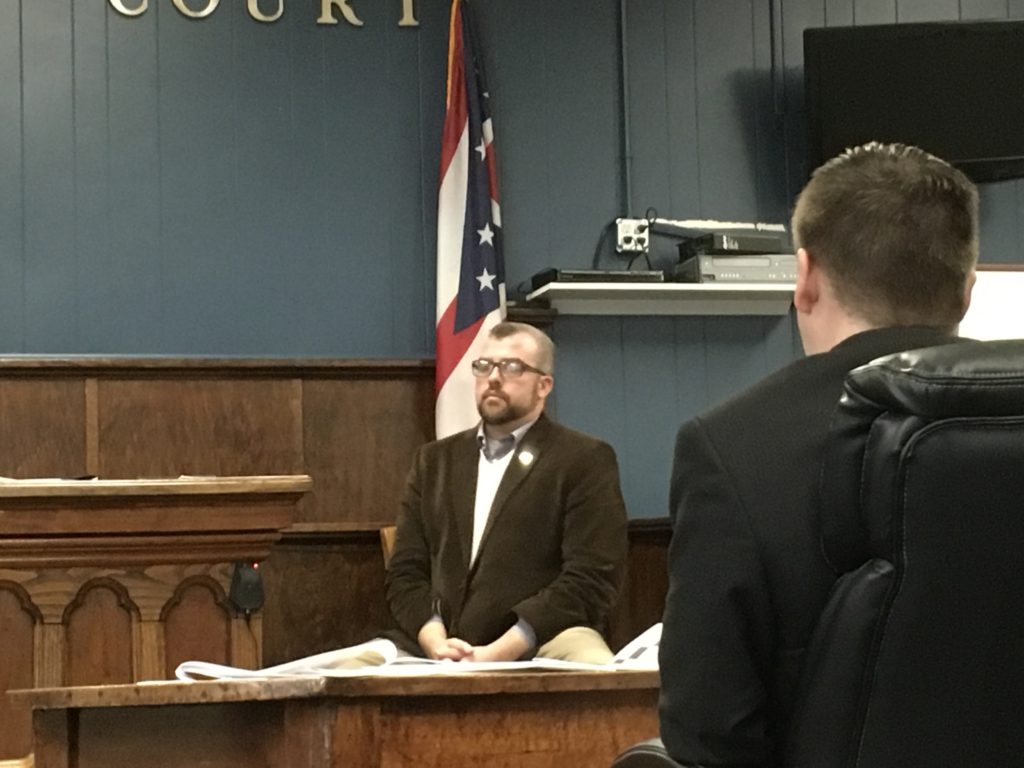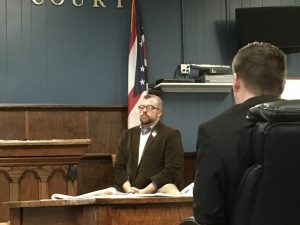County contends taxpayers to be ‘on the hook’ if injunction not granted, awaiting judge’s ruling

County Commissioner Randy Smith gives testimony as he is questioned by Meigs County Prosecutor James Stanley at the injunction hearing. Photo by Carrie Gloeckner.

POMEROY – Judge D. Dean Evans will be handing down a decision in the matter of an injunction filed by the Meigs County Commissioners against the Village of Rutland.
Meigs County Prosecuting Attorney James Stanley was serving in his capacity as attorney for the Meigs County Commissioners. The Village of Rutland was represented by attorneys Richard Clagg and Rusty Miller. Clagg spoke in court for the defendants.
Rutland Village Mayor April Burke was in the courtroom sitting behind the village attorneys for most of the hearing until the break after Meigs County Commissioner Randy Smith gave testimony on the witness stand. After his testimony, the court took a brief break. Mayor Burke, Miller and Clagg left the courtroom. When the hearing resumed, Clagg and Miller returned.
Commissioner Smith remained seated next to Prosecutor Stanley throughout the hearing, excluding his time on the witness stand.
During his lengthy testimony and cross examination, Commissioner Smith testified concerning the Meigs County Commissioners trying to communicate with Rutland Village officials. He also detailed his involvement and why the Commissioners believe they own the property being disputed which is known as the old bus garage property next to the Rutland Civic Center and Village Hall.
Both sides are awaiting the ruling expected to be handed down by Judge Evans as soon as this week.
Opening Statements
Prosecutor Stanley outlined that the county “graciously took over the failing Rutland water and sewer departments” and described briefly the history with the County Commissioners becoming involved with the Village of Rutland and the property in question.
Clagg said the village disagrees with the claims made by the county and that the county could not meet the burden of proof required in the case. Clagg asked for any witnesses in the case to be instructed to leave the courtroom.
Stanley stated he was only calling one witness. Meigs County Commissioner Randy Smith was called to the stand.
Smith Testimony
Prosecutor Stanley asked Commissioner Smith to briefly outline what are some of the responsibilities of being a county commissioner. Smith said they oversee the county budget, supervise and appoint various directors, involved with economic development and other duties including being responsible to maintain county property for the taxpayers.
Stanley asked Smith about the events as he understood them involving the Meigs County Commissioners taking over the water and sewer departments for Rutland. Smith explained that in 1990 the Village of Rutland put in a new sewer system. The Village obtained funding through various sources including loans through agencies such as the Ohio Water Development Authority (OWDA) and the Ohio Environmental Protection Agency (Ohio EPA). “
From 1990 to 2012 the Village had seriously defaulted on those loans,” Commissioner Smith testified.
At that point, according to his testimony, the County Commissioners were approached to step in and take over the debt and the failing water and sewer departments. He outlined there were multiple problems facing the Village.
Commissioner Smith said the loss of “tens of thousands of dollars involved in a theft case with a village clerk” only exasperated the situation and the Village could not repay the debt. He said the Village also had issues with the Ohio Bureau of Worker’s Compensation for not paying as well. Commissioner Smith said that by the time the county took on the debt just related to the water and sewer departments, it had reached in excess of $600,000. In the contract signed in April 2012, the Meigs County Commissioners took on the responsibilities for water and sewer in Rutland. The County Commissioners then by resolution created the Meigs County Water and Sewer District.
Stanley asked Commissioner Smith as to the current status of the debt the County took on for the Village and exactly who is now responsible for that debt.
Smith said now the responsibility is, “Ultimately all of the residents of Meigs County. We have been unable to gain any ground on the debt. The debt continues to grow.”
Smith said there are two annual payments the Meigs County Commissioners must make on the loan repayment.
Stanley asked about not only the property in question, but other assets associated with it. Smith detailed several things including equipment such as a yellow truck along with a back hoe that had been stored in what is referred to as the bus garage in court. Other items related to the water and sewer departments such as pipes, meters, and other equipment were stored in the old bus garage as well.
When questioned about the transition from the Village to the County, Smith said they received a printer for printing off water and sewer bills along with some paper to go with it. He said the Commissioners had to have then Prosecuting Attorney Colleen Williams to send a letter concerning the other items and it took about a year for the Commissioners to have the backhoe transferred. According to his testimony, it became a long, drawn out process.
“We retained village staff to work,” Commissioner Smith said. He said that staff needed the backhoe for dealing with leaks, repairs and maintenance.
Smith repeatedly explained the faults in the current sewer system which is a grinder system. He told the court when the system was put in in 1990 it was already an antiquated system and should never have been installed.
Stanley questioned Smith about the garage utilities, specifically the electric bill. Smith said the latest bill the Commissioners had received was for Jan. 23, 2017. The service address for that bill was read by Smith. “359 Main Street, Bus Garage, Rutland, Ohio,” he said and added the Commissioners paperwork attached to all bills was stapled to it with the voucher for payment being $23.46 paid by the County Commissioners.
Smith was then asked how he came to find out anything concerning the sale of the bus garage property. He answered that he first heard of it as a rumor and initially dismissed it as rumor. Then in July 2016 he was questioned several times about the sale to Dollar General at a son’s ballgame. At that point he contacted the Village office and requested to be put on the agenda to talk directly to Mayor Burke and Village of Rutland Council. Smith said he presented the plat map, deed, electric bill and other documentation to Mayor Burke and the Council concerning Meigs County’s claim on the property. At that point, he stated Mayor Burke informed him it was “just talk.” Smith said he spent about one hour and 45 minutes explaining the Meigs County Commissioners’ stance and talking with Council about the property.
In the months following the meeting, Smith said Meigs County Commissioner Tim Ihle was on vacation and was not available to pick up the bills from drop box by the Village Hall. Commissioner Ihle normally picks up the payments, but Smith picked up the task while Ihle was on vacation. At one of those pick-ups, Smith said he noticed what appeared to be new doorknobs on the bus garage. He went over to investigate it and found not only new knobs, but a no trespassing sign that stated, “By Order Of The Rutland Police Department And Mayor’s Office No Trespassing Violators Will Be Prosecuted.”
Smith said he asked one of Rutland Police Department Officers to assist him at that point. He said Capt. Shannon McCall went with Smith to the bus garage and shown his flashlight in the building. Smith said he could not access the building as the locks had been changed. Inside Smith said he saw a green S10 which did not belong to the county in the garage. He said everything else including the backhoe was gone. Smith said he asked Capt. McCall about what had happened to the contents of the building. Smith was eventually directed to where Capt. McCall shown his flashlight on a large pile next to the dumpster at the back of the Civic Center. Outside in the rain “tossed back there” were meters, pipes and other equipment used by the Meigs County Water and Sewer District. Smith said Capt. McCall indicated the equipment was removed by Rutland Village employees including Capt. McCall himself. Smith said a Meigs County Water and Sewer District employee then attempted to salvage as much as possible from the pile following the discovery. Smith said one of the meters is worth $1,500. He said there were multiple meters tossed out. Most of the equipment was not salvageable according to Smith.
“We have been locked out of the bus garage from that August meeting forward,” Smith said. He he tried to get on the agenda for the Village’s December meeting, but was informed by the clerk that he was not permitted to address the Council. The County Commissioners were then referred to contact the Village of Rutland through their attorneys.
Nothing else happened with the situation through December and then in January Smith said he was at the Meigs County Tax Map Office on an unrelated matter when he found out the maps were being redrawn related to the bus garage. It was then he discovered the village was “under contract with Dollar General since June 2016” which was two months prior to his appearance before Mayor Burke and Rutland Council when Smith had been told it was “just talk” concerning Dollar General.
Stanley questioned Smith about the property, the condition of the system. Smith testified to the antiquated state of the system and that it is inappropriate for a village. He said those issues are what is leading up to the current plans for a new system which will help address multiple issues including the rates Rutland residents are having to pay. He said the County Commissioners have secured funding from the Army Corps of Engineers and other sources to put in a new system which is still being designed by the engineers. The property of the bus garage is especially important as it may be the location of a lift station and/or continued storage for equipment for the water and sewer district. If the court permits the sale to go through with the lifting of the temporary injunction, the County would have to purchase other property in the village and build a storage facility for the Meigs County Water and Sewer District. According to Smith, this just adds to the burden already taken on by the taxpayers of Meigs County.
“We are very close to breaking ground on the new system,” Smith said. He added that the County Commissioners have been working with the Army Corps of Engineers, the USDA and other funding sources to be able to install the new system.
He said the engineers are still working on the plans but the bus garage property is important. Smith noted the damage that would be done to the county if the sale of the bus garage property was not stopped. He testified that it is “impossible to replace it.”
Smith said the county would have to purchase a property creating an additional cost, continuing the financial damage to the county, continuing to further the burden the people of Meigs County that have been shouldering the debt for the Village of Rutland. Even if the property was not used for a lift station, a new storage facility would have to be constructed.
At that point, Prosecutor Stanley ended questioning Commissioner Smith and Clagg began his cross examination of the Meigs County Commissioner.
Cross Examination of Smith
Clagg questioned why Smith “particularly took this project on” referring to the village. Smith explained the commissioners divide tasks amongst the three of them and part of his position involves the Meigs County Water and Sewer District which then involves dealing with the Village of Rutland.
Clagg tried to trip Smith up on some of his testimony concerning communication with the Commissioners and the Village, but Smith stayed on point. His testimony remained consistent.
The attorney for the Village of Rutland then took several minutes to go through notes before returning to questioning Smith. He asked Smith about property not being transferred in three years. Smith continued to explain the issues the Commissioners had had in transferring the backhoe and other property. Smith said it was up to the Village to transfer the property and they were supposed to have do so. Clagg then returned to his notes.
Clagg questioned the ownership of the property and what damages the Commissioners would actually incur if the property was sold. He asked about the drop box for residents to pay their water and sewer bills that is not located on county property but on property owned by Rutland Village. Smith said the box was there for the convenience of residents and repeated what he had stated previously about the damage to the county with having to purchase another property if the bus garage property was sold. He also stated again the position that the county owns the property. Clagg ended with a question to Smith about knowing the tax value of the property which Clagg said was $126,000. Smith said he was not aware of that value without looking it up.
Clagg ended his questioning at about 10:30 a.m. At that point Stanley was able to question Smith again on the redirect.
Redirect of Smith
Stanley asked about the creation of the Meigs Water and Sewer District. Smith answered it was created by resolution by Meigs County Commissioners at that time in 2012. The question of the purpose of the bus garage was again visited.
“It’s always been a storage building for the water/sewer district,” Smith answered, saying when assessing the assets the garage was considered part of those assets according to Smith. He continued to elaborate on the various organizations and governing agencies that toured the facilities when this transition was happening from the village to the county when assessing the assets. Touring also included the bus garage. He also said that then Mayor Lowell Vance was quick to give the electric bill to the county for the bus garage.
Additionally, further questions were asked regarding the current status of the bus garage and the county in which Smith answered the county was still currently “locked out” of the garage. Liens on the property were also brought up. There have been liens on the property the village is intending to sell. Smith said in the hands of the county, the property is “unencumbered” elaborating that those liens according to the contract with the county would not be transferred to the county.
Smith again answered questions concerning the debt the county has had to deal with from the village. Smith said the Meigs County Commissioners have had to pull money from the County General Fund to bolster the “failing system” of the village water and sewer system.
Clagg questions Smith again
Clagg again questioned Smith on the stand. Clagg asked why Smith felt the no trespassing sign referred to him. “I felt like I would be prosecuted or anyone in my employ with the county,” Smith said.
Clagg then questioned him about specific dates trying to again trip Smith up on his previous testimony. Smith, however, stayed on point and his testimony remained consistent.
Smith steps down from witness stand
At 10:43 a.m. Smith finally was able to step down from the witness stand. The court took a brief recess before closing arguments began. The attorneys, Judge Evans and Smith returned at 10:55 a.m.
Closing arguments
“The contract clearly sets forth the terms of the agreement,” Stanley said, stating the property in question belongs to the County and not the Village.
Stanley argued vehemently that the tax payers of Meigs County should not be further burdened by the actions of Rutland Council. He cited in 2012 when then Mayor Vance delivered the electric bill to the Meigs County Commissioners. He said since that time the County has paid for that bill. He argued that the claim needs to be heard in the matter and the asked Judge Evans to grant the injunction. Stanley continued that if the property were sold it would add further expense to the taxpayers and irreparable harm.
Clagg objected at this point, but Judge Evans said, “I will allow latitude. It’s closing remarks.”
Stanley clarified that it was all in the filed affidavit before the court. “They would be on the hook,” Stanley said of the taxpayers.
He said they would have to carry the burden not only for the loss of the property usage, but for further debt.
“The Meigs County taxpayer would be the ones footing the bill,” he said adding the County has a legitimate interest in this matter and asked the injunction be granted.
Clagg then presented the closing remarks for the Village of Rutland. He called the preliminary injunction an “extraordinary move” with this being a simple transaction that should be allowed to move forward. Clagg further said the County had failed to meet the measure of irreparable injury because there was no request of monetary damages cited.
Clagg argued on the technical aspects of the case that the County Commissioners had failed to meet the burden of proof. He said they were selling the property for more than it was worth, but did not disclose the intended sale amount. He stopped several times during the closing remarks to check his notes.
“I hope no one gets a hold of my electric bill soon and starts paying it,”Clagg said and following another long pause, he said the property was not impossible to replace for the County.
He said the use of the property was “widely speculated” based on unfinished engineering results. He continued to argue the County failed to meet the burden of proof for the injunction before Stanley had a chance on redirect of the closing remarks..
Redirect of Closing Remarks
Stanley said that he learned of the impending sale of the property on Jan. 20 and had to meet with County Commissioners in a public meeting. He said they were following proper procedures with filing the temporary and preliminary injunctions.
“Rutland was doing this behind the back of the county,”Stanley argued.
Stanley continued to work on the points Clagg had brought up. Stanley argued that there was “no plain, adequate and complete remedy” if the injunction was not granted and the sale permitted to move forward before ownership could be heard in court (which would have to be filed separately). He said the County Commissioners did not seek money because monetary damages were not good enough in this case. He continued to strongly argue the point that the County Commissioners were acting on behalf of the taxpayers of Meigs County.
Judge Evans intently listened to Stanley’s re-direct closing argument.
Clagg objected at one point concerning documents Stanley was referencing. Judge Evans said, “The documents speak to themselves.”
Clagg continued to say the County failed to meet the burden, that they had no evidence.
Judge Evans said the court would take everything under advisement. A decision could be handed down this week on the preliminary injunction, but Judge Evans did not address a time from in which a decision could be reached.
Other articles related to this story previously published on the Meigs Independent Press can be found below.








